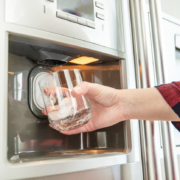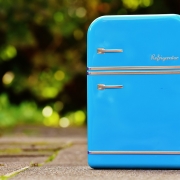How to Try to Fix Common Refrigerator Problems
The refrigerator is one of the most important – and most used – appliances in the home. Unfortunately, they are not indestructible, and only last for so long. Daily wear and tear takes its toll, just like with your oven, dishwasher, dryer, and washer. Proper maintenance and care can extend the life of your fridge, but only for so long. When something does break on your unit, you should know that a quick fix by you can solve many issues, without requiring an refrigerator repair pro in San Francisco. Sometimes, it’s just a matter of unplugging and re-plugging in your fridge.
Following are some common problems with refrigerators and what you should try before you call for appliance repair in Marin County:
- Water Dispenser Stops Working
There could be several reasons for this, with the most common being that the water tube in the door has frozen. Disconnect the tube at the bottom of the door and blow air through it. If you can’t, it’s frozen. All it needs is a little time to thaw. Keep your freezer set between 0-10 degrees Fahrenheit to prevent freezing. Another cause could be a faulty water inlet valve. Check to make sure the water pressure to the valve is at minimum 20 psi. Also, you can check the water flow from your house supply to make sure it’s at least 20 psi.
- The Ice Maker Overflows
This common problem is usually caused by an issue with the water inlet valve – specifically, if the water pressure in the valve is below 20 psi, it may not close completely as it should. If the pressure is fine, the valve may be defective. In this case, it will need to be replaced by one of our San Rafael repair experts.
- Ice on the Bottom of Freezer
A blocked defrost drain is often to blame for sheets of ice on the freezer floor, along with water dripping into the refrigerator. Luckily, it usually only requires a simple fix: store your food elsewhere for a bit, unplug the appliance, and let it defrost. If it doesn’t fix the problem, you can remove the back wall of the freezer and make sure there are no food particles clogging the small hole near the evaporator coils. If this problem remains or persists frequently, consider installing a drain heater to assist with defrosting. If you’re not comfortable doing any of this yourself, don’t hesitate to contact our appliance repair experts in Mill Valley for help.
- Water Leaking onto the Floor
This issue can be a little tricky to solve, because it could be caused by a few different things. The two most common causes, however, are pretty easy to do yourself, without the help of a pro. Check the defrost drain – usually on the back wall of the freezer – and make sure it isn’t blocked with food or debris. If it’s blocked, try draining it from the inside using warm water, pipe cleaner, or even a turkey baster. If this doesn’t work, locate the defrost drain hose in the back of the service panel. There should be a rubber valve – remove it and wash with soap and hot water, then reinstall. Another cause of puddles under the fridge can be a frozen or clogged water supply line. Unplug your refrigerator and find the shut-off valve. This is usually under the sink, behind the fridge, or below it in a crawl space or basement. Make sure it’s closed tight. If it’s broken at all, it’ll need to be replaced.
While these are just a few of the problems you might have with your refrigerator, if you can’t find and fix the issue on your own, Absolute Appliances Repair is always just a quick call away. Our team serves customers throughout the entire area, from Larkspur to Novato, and everywhere in between. Contact us today for appliances repair in the San Francisco area.



